
Ḥadīth in Islam refers to what Muslims believe to be a record of the words, actions, and the silent approval of the Islamic prophet Muhammad. Hadith have been called "the backbone" of Islamic civilization, and within that religion the authority of hadith as a source for religious law and moral guidance ranks second only to that of the Quran. Scriptural authority for hadith comes from the Quran which enjoins Muslims to emulate Muhammad and obey his judgments. While the number of verses pertaining to law in the Quran is relatively few, hadith give direction on everything from details of religious obligations, to the correct forms of salutations and the importance of benevolence to slaves. Thus the "great bulk" of the rules of Sharia are derived from hadith, rather than the Quran.

Muhammad was an Arab religious, social, and political leader and the founder of Islam. According to Islamic doctrine, he was a prophet, sent to preach and confirm the monotheistic teaching preceded by Adam, Abraham, Moses, Jesus, and other prophets. He is viewed as the final prophet of God in all the main branches of Islam, though some modern denominations diverge from this belief. Muhammad united Arabia into a single Muslim polity, with the Quran as well as his teachings and practices forming the basis of Islamic religious belief. He is referred to by many appellations, including Messenger of Allah, The Prophet Muhammad, Allah's Apostle, Last Prophet of Islam, and others; there are also many variant spellings of Muhammad, such as Mohamet, Mahamad, Muhamad, and many others.
Sunnah, also sunna or sunnat, is the body of literature which discusses and prescribes the traditional customs and practices of the Islamic community, both social and legal, often but not necessarily based on the verbally transmitted record of the teachings, deeds and sayings, silent permissions of the Islamic prophet Muhammad, as well as various reports about Muhammad's companions. The Quran and the sunnah make up the two primary sources of Islamic theology and law. The sunnah is also defined as "a path, a way, a manner of life"; "all the traditions and practices" of the Islamic prophet that "have become models to be followed" by Muslims.

In Islam, duʿāʾ, literally meaning appeal or "invocation", is a prayer of supplication or request. Muslims regard this as a profound act of worship. Muhammad is reported to have said, "Dua is the very essence of worship."
In Islam, shirk is the sin of idolatry or polytheism, i.e., the deification or worship of anyone or anything besides Allah, It means ascribing or the establishment of partners placed beside Allah. It is termed Tawhid (monotheism). Mušrikūn مشركون are those who practice shirk, which literally means "association" and refers to accepting other gods and divinities alongside God.

Companions of the Prophet or aṣ-ṣaḥābah were the disciples and followers of Muhammad who "saw or met the prophet during his lifetime and were physically in his presence". "Al-Ṣaḥābah" is definite plural; the indefinite singular is masculine صَحَابِيٌّ, feminine صَحَابِيَّةٌ.
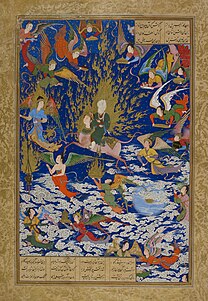
The Israʾ and Miʿraj are the two parts of a Night Journey that, according to Islam, the Islamic prophet Muhammad took during a single night around the year 621. Within Islam it signifies both a physical and spiritual journey. The Quran surah al-Isra contains an outline account, while greater detail is found in the hadith collections of the reports, teachings, deeds and sayings of Muhammad. In the accounts of the Israʾ, Muhammad is said to have traveled on the back of a winged mule-like white beast, called Buraq, to "the farthest mosque". By tradition this mosque, which came to represent the physical world, was identified as the Al-Aqsa Mosque in Jerusalem. At the mosque, Muhammad is said to have led the other prophets in prayer. His subsequent ascent into the heavens came to be known as the Miʿraj. Muhammad's journey and ascent is marked as one of the most celebrated dates in the Islamic calendar.

Naskh (نسخ) is an Arabic word usually translated as "abrogation". In Islamic legal exegesis, naskh is a theory developed to resolve seemingly contradictory rulings of Islamic revelation by superseding or canceling the earlier revelation. In the widely recognized and "classic" form of naskh, an Islamic regulation/ruling (hukm) is abrogated in favor of another, but the text the hukm is based on is not eliminated.
Da‘wah is the proselytism of Islam.
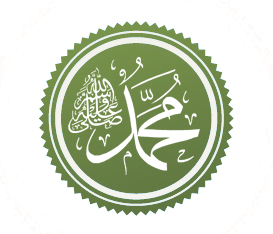
Ahl al-Bayt is a phrase meaning "People of the House", "People of the Household" or "Family of the House". Within the Islamic tradition, the term mainly refers to the family of the Islamic Prophet Muhammad, and to a lesser extent, his ancestor Ibrahim (Abraham),

According to Islamic sources, The Event of Mubahala was a meeting between the Islamic prophet Muhammad and a Christian delegation from Najran, in the month of Dhu'l-Hijja, 10 AH, where Muhammad invoked a curse attempting to reveal who was lying about their religious differences.
Tawassul is an Arabic word originated from wa-sa-la- wasilat. The wasilah is a means by which a person, goal or objective is approached, attained or achieved. In another version of the meaning of tawassul in another text: Tawassul is an Arabic word that comes from a verbal noun, wasilah, which according to Ibn Manzur in Lisān al-'Arab means "a station of King, a rank, or act of devotion". In other words, it refers to a position of power due to one's proximity to the king or sovereign. While the tawassul or tawassulan is the use of wasilah for this purpose. In religious contexts, the tawassul is the use of a wasilah to arrive at or obtain favour of Allah.

The history of Quran deals with the timeline and origin of the Quran, the Islamic Holy Book and its written compilations into manuscripts. It spans several centuries, based on historical findings and forms an important part of early Islamic history.
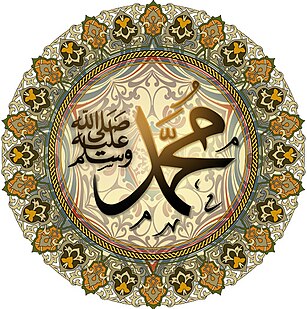
Muḥammad ibn ʿAbdullāh ibn ʿAbdul-Muṭṭalib ibn Hāshim, commonly known as Muhammad, is the seal of the Messengers and Prophets of God in all the main branches of Islam. Muslims believe that the Quran, the central religious text of Islam, was revealed to Muhammad by God, and that Muhammad was sent to restore Islam, which they believe to be the unaltered original monotheistic faith of Adam, Abraham, Moses, Jesus, and other prophets. The religious, social, and political tenets that Muhammad established with the Quran became the foundation of Islam and the Muslim world.

The Quran is viewed to be the scriptural foundation of Islam and is believed by Muslims to have been sent down by Allah (God) and revealed to Muhammad by the angel Jabreel (Gabriel). The Quran has been criticized both in the sense of being studied as a text for historical, literary, sociological and theological analysis by secular, (mostly) Western scholars who set aside doctrines of its divinity, perfection, unchangeability, etc. accepted by Muslim scholars; but also in the sense of being found fault with by those — including Christian missionaries and other skeptics hoping to convert Muslims — who argue it is not divine, not perfect and/or not particularly morally elevated.
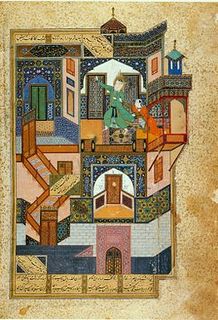
Yusuf is the 12th chapter (Surah) of the Quran and has 111 Ayahs (verses). It is preceded by sūrah Hud and followed by Ar-Ra’d. Regarding the timing and contextual background of the supposed revelation, it is an earlier "Meccan surah", which means it is believed to have been revealed in Mecca, instead of later in Medina. It is said to have been revealed in a single sitting, is unique in this respect. The text narrates the story of Yusuf (Joseph). While other surahs tend to jump between topics, this sura is special in sticking to its central theme throughout, telling a coherent story in chronological order.
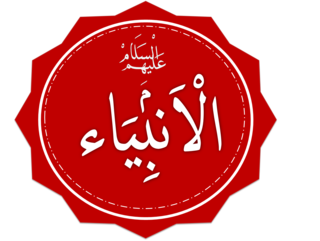
Prophets in Islam are individuals who Muslims believe were sent by God to various communities in order to serve as examples of ideal human behavior and to spread God's message on Earth. Some prophets are categorized as messengers, those who transmit divine revelation through the intercession of an angel. Muslims believe that many prophets existed, including many not mentioned in the Quran. The Quran states: "There is a Messenger for every community". Belief in the Islamic prophets is one of the six articles of the Islamic faith.

The Quran enumerates little about the early life of the Islamic prophet Muhammad or other biographic details, but it talks about his prophetic mission, his moral excellence, and theological issues regarding him. According to the Quran, Muhammad is the last in a chain of prophets sent by Allah.

Al-Suffah (الصُّفّة) or Dikkat Al-Agawat is a place that was available at the rear side of Al-Masjid al-Nabawi, during the Medina period (622-632). It was initially available at the North-East corner of the mosque and Muhammad ordered it to be covered by palm leaves in order to provide shade, hence it was called Al-Suffah or Al-Zullah (الظلة); i.e. the shade. It was moved several decades later into another place in the mosque during an expansion project.
Morality in Islam encompasses the concept of righteousness, good character, and the body of moral qualities and virtues prescribed in Islamic religious texts. The principle and fundamental purpose of Islamic morality is love: love for God and love for God's creatures. The religious conception is that mankind will behave morally and treat each other in the best possible manner to please God.










